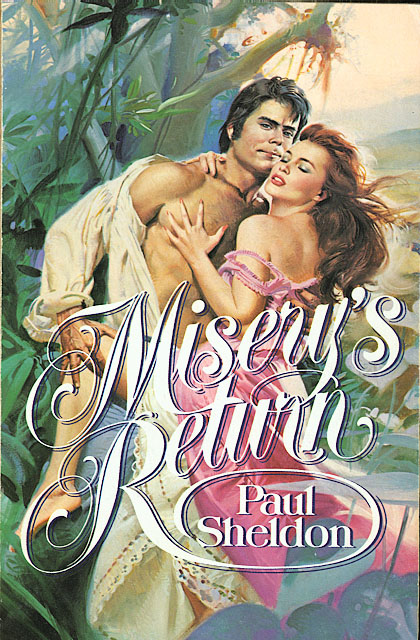Growing up, for me, Stephen King was synonymous with the
written word. Sure Shakespeare was what they crammed down your throat in
school (as they should), but King was living and breathing. He was still
producing. Not to say that I read any of his books growing up. No
way, much too advanced for me, but I saw all the movies. I used to watch It
over and over. Pet Cemetery was another favorite, and Stand
By Me convinced me that every child actor since the 1980s are no talent
upstarts that have no place being in show biz. As a kid, reading and
watching were one and the same. Now as a much older and wiser (I hope)
Stephen King fan, I can tell the difference between what’s on the page and
what’s on the screen. And after watching Misery countless times, I
have to say the tried and true idiom, “the book’s better than the movie” still
holds true even when the movie receives Oscar nods.
I won’t focus too much on the story. The story for the most part is the
same. A crazed fan kidnaps and tortures
her favorite author after pulling him from a car wreck. And while the scope of the movie is a
little bigger since we get more than one point of view, the film and novel are
close enough as far as that goes.
No, what I want to discuss are the characters. First, James Caan’s Paul Sheldon is
infinitely cooler than Paul Sheldon. And where most of the time, cool
means better, here in King’s Misery, not so much. James Caan is a
tough actor. He usually plays tough characters that remain true blue through
and through and he brings that toughness to Paul Sheldon. But Paul
Sheldon isn’t tough. He is what I imagine King is: a physically weak,
squirrely kind of writer. It’s a personality that makes you wonder if he
really will make it out of this or not.
And we see this from the very beginning of the novel. As soon as
Paul is semi-coherent, he is already cowed by Annie. He begs for his
meds. He drinks dish water. It isn't until Annie makes him burn his
manuscript that he begins to recognize he must fight. And that's where
the sly, James Caan version begins to rear his ugly-soon-to-be-one-legged-head.
And while James Caan plays up Paul Sheldon's toughness,
Cathy Bates played down Annie Wilkes's. In the film, Cathy Bates was
lauded for her performance and she should have been. She does a fantastic
job. But the artistic direction of her character is down played tremendously.
Annie Wilkes isn't the loving, manic-depressive, number one fan that
slowly transforms into the crazed woman bent on killing her favorite author.
No, she's a manipulative nut-job who, from the very beginning, tells Paul
he owes everything to her kindness and generosity. The transformation in
the novel is much more subtle and drawn out. It’s more of a demotion of levels of psychosis. Paul
knows from the very first pages, it's strange that he isn't in the hospital but
he's smart enough not to ask. And she never mentions it either. She gives him no hope from the very
beginning that help will come for him.
And it’s that constant taunting as Paul struggles to find hope that
Annie quickly extinguishes that brings more and more out of the story that the
film lacks.
And it’s that hopelessness that brings the real horror
aspect of the story out. In the
film, we’re shown in multiple perspectives what is happening. In fact, he never
asks. We get Paul and the old sheriff in town. We get eagle's eye
views of what's transpiring. In the novel, Paul's all we get. So we
have no idea if his car is found, if there’s a manhunt, anything. We're
as much alone as Paul. Imagine how
much more terrifying that would’ve been to see on the silver screen?

Like you, I came into this already seeing the film. And I think seeing James Caan broken down is much more dramatic than Paul in the book. Shows us that even the tough guy can be broken, something that we tend not to focus on in films.
ReplyDeleteI also like your idea of the film being shot from a single room. The book has such a claustrophobic feel, but the movie takes us out and bout the county, showing us the search. It would be really interesting to see that hopelessness portrayed on screen... someday.